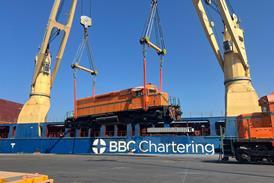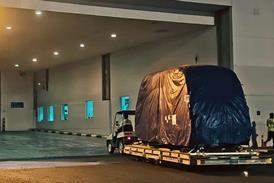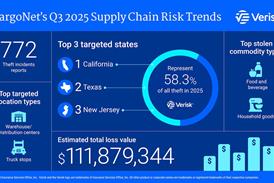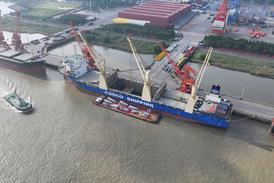United European Car Carriers (UECC) is boosting sailing frequency and capacity on its North-South network with the addition of the dual-fuel LNG PCTC Blue Heritage, as well as another port of call in Türkiye.
The 200 m, 7,000 ceu Blue Heritage has 12 decks, four of which are hoistable and suitable for high and heavy (H&H) cargoes. It is the sistership to the Blue Aspire, also previously taken under operation by UECC, and is equipped with dual-fuel LNG engines that are able to run on liquefied biomethane (LBM), which has potential for significant emissions savings.
“The flexible deck configurations of the Blue Heritage and Blue Aspire also provide versatility in handling a wide range of cargoes – from vehicles to rolling H&H [cargoes] and breakbulk equipment – in line with the diverse needs of customers,” said UECC chief operating officer Per Christian Mørk.
Blue Heritage will be deployed on the North-South route spanning the Mediterranean and Northern Europe, which is being extended with the inclusion of the Turkish port Yarimca for regular calls, in addition to Efesan and Autoport in Türkiye.
This means there will be three vessels on a port rotation of Flushing, Zeebrugge, Cuxhaven, Vigo, Yarimca, Efesan, Autoport and back to Flushing. Another four vessels will run on the port rotation of Cuxhaven, Bremerhaven, Zeebrugge, Portbury, Vigo, Sagunto, Livorno, Piraeus, Autoport and back to Cuxhaven.
“Our North-South service is the largest loop we operate and as such absorbs also the largest number of vessels. By adding capacity, this enables us to add ports in cooperation with our customers to tailor-make services,” Mørk added.
With the addition of Blue Heritage, seven UECC vessels are deployed on the route, which means it can offer a sailing frequency of 4.5 days from Türkiye to Northern Europe.
The ability for these vessels to run on LBM, meanwhile, is in line with UECC’s Sail for Change programme, where the fuel is being bunkered on LNG-powered vessels. Supported by major automotive manufacturers Toyota, Ford and JLR, the initiative primarily contributed to a reduction of 107,000 tonnes in well-to-wake CO2 emissions last year – an increase of 70 percent compared to 2023.
















